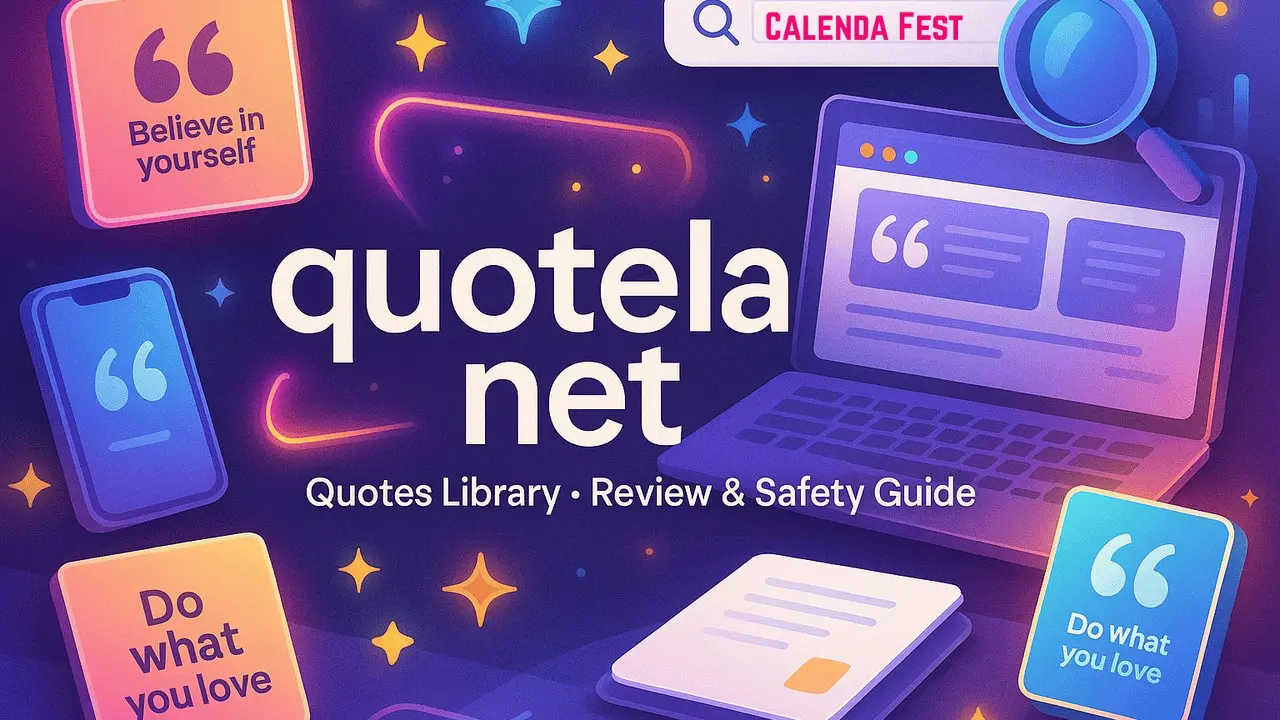If you’ve run into quotela net in search results, you’re not alone. The name pops up across a cluster of quote-themed pages and explainers that promise everything from daily inspiration to neatly categorized sayings for captions, speeches, journals, and classroom slides. The clearest public footprint ties the brand to a quotes library with category pages such as Quotes, Life Wisdom, Self-Growth, Funny Quotes, Life Quotes, Leadership, and Mindfulness. That catalog appears on a site branded as “Quotela” and repeatedly references quotela.net in headers, footers, and post titles one reason the term keeps surfacing in your feed. On those pages, the format is straightforward: headline, a short intro, and a list of quotes or a themed roundup ready to copy for social use, graduation blurbs, or day-starter affirmations. In short, quotela net presents itself as a simple, browse-and-share quotes destination, and the web around it treats it that way, too.
That said, readers also want to know whether the domain behind the name looks stable and safe. Public registries and infrastructure checkers show a normal profile: routine HTTPS, standard nameservers, and a mainstream hosting setup. A widely used trust-check site labels the domain “average to good” while cautioning that traffic is modest and that the IP hosts other low-rated sites signals that are typical on shared hosting and not, by themselves, proof of risk. When you stitch those signals together, the pragmatic view is: quotela net behaves like a lightweight quotes library with basic hosting and a small audience fine for casual browsing and collecting captions, but still worth the everyday hygiene you’d apply anywhere (don’t submit sensitive info, scan downloads, and keep your browser protections on).
What you’ll actually find: structure, categories, and how people use it day to day
Strip away the noise and focus on the on-page experience, and you’ll see how quotela net fits everyday workflows. The content is organized in familiar, reader-friendly buckets: quotes you can paste into a yearbook, quick encouragement for a work presentation, short lines for a reels caption, or a reflection for journaling. The brand presence that references quotela.net leans hard on easily scannable, evergreen topics (love, motivation, truth, “it is what it is”), and many pieces read like curated lists rather than deep essays. That format is useful when you’re prepping a slide deck, building a newsletter segment, filling in a “thought of the day,” or giving students a quotation to unpack in class. Social creators often prefer short, high-contrast lines that look good over a photo; speakers want one sentence with a memorable cadence; teachers want something that sparks a quick discussion. A quotes catalog that’s categorized and skim-friendly checks those boxes no login hoops, no complicated widgets, just text you can copy and attribute.
From an editorial standpoint, this “organized clippings” approach helps with three practical goals. First, it lowers search friction: if you remember only a theme “truth,” “resilience,” “funny senior quotes” you can find something serviceable fast. Second, it improves shareability, because list formats lend themselves to screenshots, carousels, and threads. Third, it encourages light personalization (e.g., swapping a synonym, trimming a clause, or adding a context line) so the quote fits your voice. That’s why quotela net pieces show up in best quotes for X roundups and “caption ideas” posts around the web: they’re ready to lift into a project with minimal edits, especially when you’re on a deadline and need clean lines that won’t derail the flow of your message. The repeated mentions of quotela.net throughout the category hub reinforce that intent: browse, select, share.
Safety ownership clues and a plain-English tech snapshot so you can trust what you’re using
Whenever you plan to cite or share content from a small site, it’s smart to look at housekeeping details: domain age, registrar, HTTPS, and server basics. For quotela net, public records show the domain was registered in April 2023 with Hostinger as registrar; the nameservers point to ns1.dns-parking.com and ns2.dns-parking.com; the site serves over HTTPS with a valid certificate; and the webserver reports LiteSpeed on infrastructure that geolocates to Phoenix, Arizona. Those details are routine for budget-friendly hosting and don’t raise obvious red flags on their own. A popular automated reputation checker currently describes the domain as “average to good,” while also noting low traffic and other sites on the same server again, normal on shared hosts but still a nudge to practice good browsing hygiene. In practical terms: don’t hand over personal data, keep your browser protections on, and treat it like any small content site you visit for reference. The point isn’t to dramatize; it’s to confirm that the basics are in order before you paste quotes into work docs, slides, or social posts.
There’s also a content-quality angle to keep in mind. Independent SEO reviewers have flagged some topical drift around the wider footprint—think off-topic posts (casino, crypto) mixed near quotes content. That doesn’t automatically condemn the quotes library, but it does matter if you’re a publisher or educator who needs consistent editorial focus for syllabus links or brand-safe newsletters. The smart takeaway is to double-check categories and stick to the clearly on-topic pages when you curate. If you’re building lesson plans, save the exact quote, the attributed author, and the access date in your notes; if you’re a business publisher, keep a small spreadsheet of sources you’ve vetted for tone and fit. This is standard practice for any niche content site, and quotela net is no exception treat it as a handy quotes index, not a scholarly anthology, and you’ll avoid most pitfalls.
How to get the most from it: fast workflows, ethical sharing, and smart alternatives
A quotes library is only as useful as the workflows it supports. Here’s a practical way to work with quotela net without slowing down your day. Start with the theme you actually need (e.g., “truth,” “resilience,” “leadership”), then scan the top third of a list and pick two candidates: one short for captions and one slightly longer for speeches or emails. Before you paste, add the author’s full name and, if helpful, a one line intro that frames why the quote is relevant We’re discussing candor in feedback this week, and this line nails it. For newsletters and slide decks, keep the text large and uncluttered; quotes breathe better with whitespace. If you post to social, test a light/dark background with the text centered and avoid over-decorating most engagement comes from clarity and timing rather than filters.
Ethics and legality are simple if you follow two habits. First, credit the author. A quotation is someone’s sentence; your audience expects to see a name. Second, avoid implying endorsement. If you place a quote next to a product shot or program logo, add context so it’s clearly part of your narrative, not the author’s. When in doubt about commercial use of styled images, use your own typography over a neutral background or rely on licensed templates. If you want more depth or higher editorial standards for particular occasions, mix sources: pair something you found through quotela net with lines from well-established references or primary texts you already trust. This hybrid approach keeps your voice fresh and your citations solid. And if you’re after alternatives for discovery, general-purpose quote directories and literature repositories remain useful for cross-checking attributions and seeing variants; the goal isn’t to crown one “best” site but to keep a small set of dependable sources that match your tone. Meanwhile, if you simply need a quick caption for a reel or a classroom bell-ringer, the browse-copy-share flow is exactly what a lean quotes hub is made for.
Conclusion
The name quotela net travels far because it answers a common need fast, skimmable, theme-organized quotations you can drop into captions, decks, newsletters, or classroom prompts. Its public signals point to a small, straightforward quotes site running ordinary shared hosting, valid HTTPS, and mainstream webserver software; third-party trust checks call it average to good which is typical for niche content properties with modest traffic. That’s enough for casual use as long as you follow the basics—credit authors, be thoughtful about context, avoid submitting personal data, and save your own copy of quotes you plan to reuse. For more formal publishing, treat it as a discovery starting point and corroborate attributions before you go to print. With that mindset, quotela net fits neatly into a creator’s or educator’s everyday toolkit: quick to scan, easy to repurpose, and helpful when the right line, at the right moment, makes your point land.
FAQs
1 What exactly is quotela net?
It’s a quotes-focused brand that appears online as a simple library of themed quote lists—useful for captions, slides, and short reading prompts. The public-facing pages that reference quotela.net feature categories such as Quotes, Life Wisdom, Self-Growth, Funny Quotes, Life Quotes, Leadership, and Mindfulness.
2 Is it safe to browse and copy quotes from there?
Automated trust checks currently rate the domain as “average to good,” with valid HTTPS and routine shared-hosting characteristics. As with any small site, avoid submitting sensitive details and keep standard browser protections enabled.
3 Who hosts it and how old is the domain?
Public records indicate the domain was registered in April 2023 with Hostinger as registrar, uses ns1/2.dns-parking.com nameservers, runs LiteSpeed, and geolocates to Phoenix, Arizona. These are common choices for small content sites.
4 Why do so many different blogs talk about quotela net?
Because quote lists are highly shareable, you’ll find explainers and roundups across various blogs that introduce quotela.net to readers looking for “best quotes for X” or “daily inspiration” posts. That amplification explains why the name appears widely in search results.
5 Are there any editorial caveats to keep in mind?
Independent SEO reviewers have noted some topical drift in the broader footprint (e.g., off-topic posts mixed near quotes content). If you’re linking in syllabi or branded newsletters, stick to clearly on-theme pages and save citations with dates.




